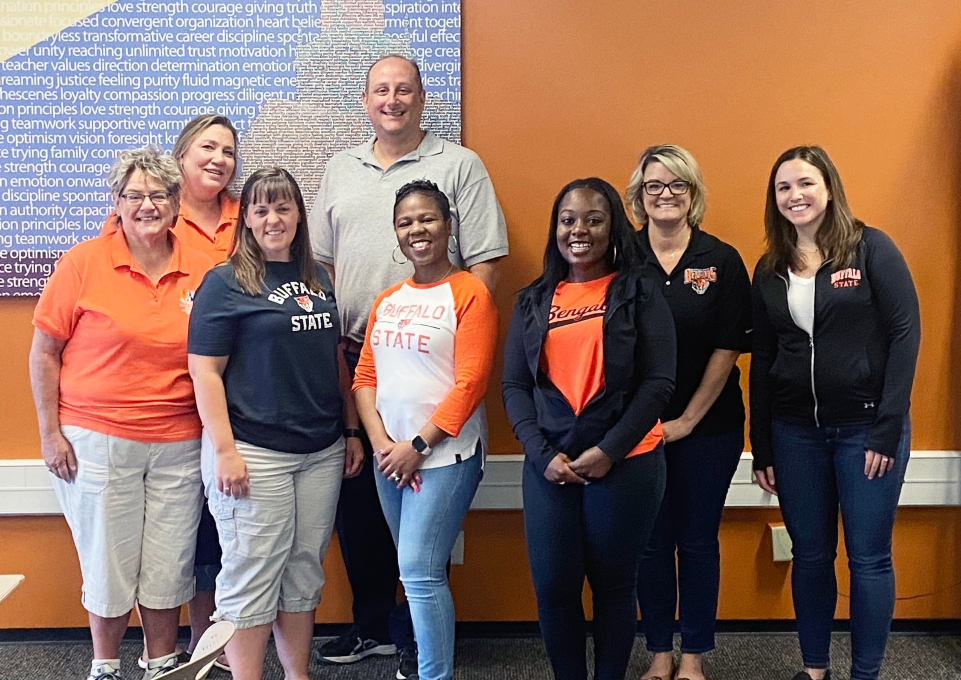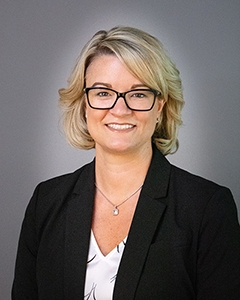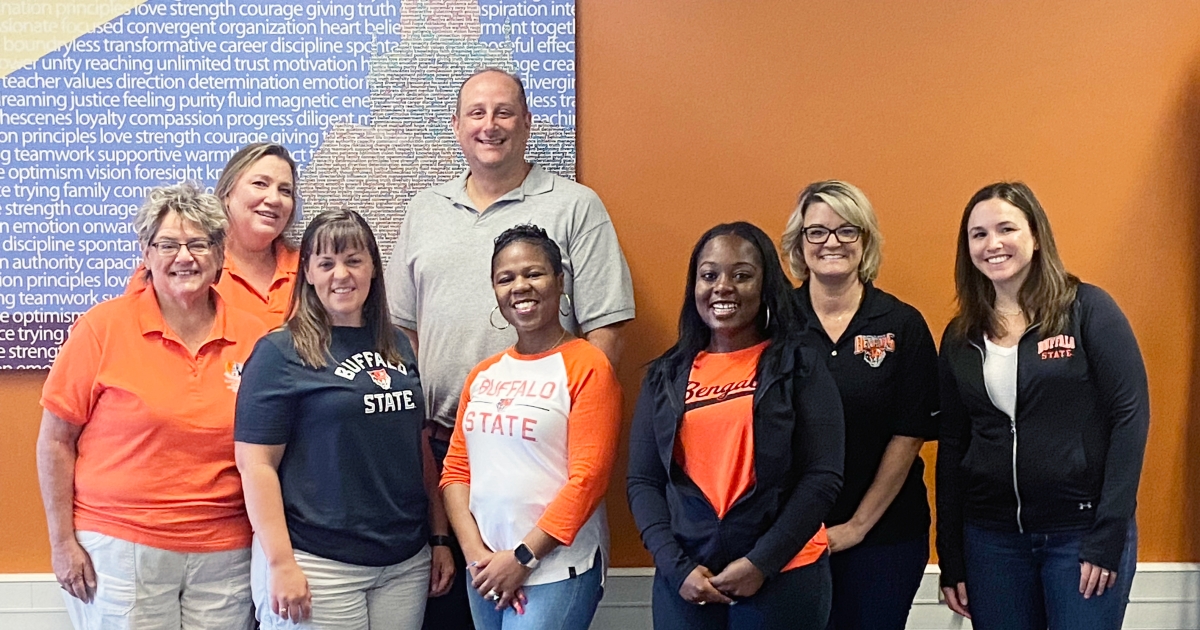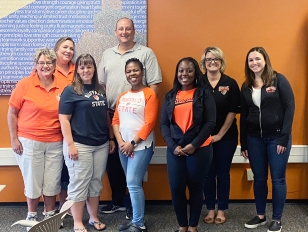
Since the start of the COVID-19 pandemic, the employment landscape has been shifting rapidly, and getting a foot in the door of the working world is harder than ever for new grads. According to Business Insider, 20- to 24-year-olds constituted just 26 percent of new hires in June 2021, a 33 percent drop from the pre-pandemic figure of 39 percent. The Class of 2021 is also vying with the Class of 2020, which graduated into an economy hobbled by the pandemic and a record-high unemployment rate of 14.7 percent.
Now more than ever, it is critical for applicants entering the job market to use all the tools and resources at their disposal. Luckily for Buffalo State College students and alumni, the Career Development Center is available to give them a leg up for all their professional needs, from résumé polishing to interview preparation. CDC director Denise Harris explains how the CDC provides a much-needed edge.

Name: Denise M. Harris
Title: Director of the Career Development Center
Denise Harris has more than 18 years of higher education experience and oversees the comprehensive career development program for both the undergraduate and graduate student population at Buffalo State College. A certified career coach, Harris is a qualified administrator of the Myers-Briggs Type Indicator, a certified etiquette expert, and an ATIXA-trained Title IX investigator. She earned her bachelor of science degree in communication from SUNY Fredonia and her master of arts in college student personnel from Bowling Green State University. She’s a member of the Western New York Association of College Career Centers, the National Career Development Association, and the American Association for Employment in Education.
How long have you been the director of the Career Development Center (CDC) at Buffalo State?
I started in June—June 22, 2020—right in the middle of the pandemic. My interview was virtual, and my entire first year was virtual and then hybrid. I think starting during the pandemic forced me to be super intentional and make connections. If I was just here, I think I would’ve thought, “Oh, I’ll meet them when I meet them,” but because of COVID, I had to actually put meetings on calendars. Making connections outside of the CDC was one of my big goals when I got here, and I was able to do that.
Tell me about your background. What were you doing before coming here?
I’ve been involved with the career world pretty much my entire career. It’s my passion. I spent 10 years at Hilbert College, five years as the director of their career center, and then I was promoted to vice provost for student engagement. I really enjoyed that experience, but being in a senior-level leadership role, you are further and further away from students and doing the work of career development, which was what I loved, so I took a step back. The director of D’Youville’s career center position had just opened up, and I worked there for three years. They had just gotten a new president and were doing some innovative things around the idea of connecting offices. And then the career center director position opened here at Buffalo State, so I thought, “I’ll throw my hat in the ring and just see what happens.” Long story short—I’m here! I’m so happy. It’s been such a good fit.
When did you realize that career services was what you wanted to do?
I am a product of the SUNY system. I went to Fredonia, and I said I was going to do public relations for the Buffalo Bills. I don’t really know where that came from. I loved talking, I thought it was super fun, and it was what I wanted to do. I’m a first-gen college student, so I went in like, “I’m going to listen to what everyone says, and sit in the front row, and take notes, and go to tutoring and office hours,” and I did everything. In my junior year, I took my first public relations course. I was so excited, and then the professor started talking, and I thought, “I hate this.” And I cried. I ended up going to the career center and the woman was doing a presentation, and I knew that was what I wanted to do. I loved the professional part of it; I loved helping people. I kind of had to grieve that loss of a career, but I found this whole new thing.
Can you talk about some of the trends and challenges younger workers face in the current economy?
There are so many unique challenges facing new professionals today, virtual interviewing being one of them. Networking pipelines and opportunities have been broken due to the pandemic. New professionals need to be creative and intentional about their own professional development. The traditional 9-5 positions are being deconstructed, and a lot of work can really be done from the comfort of our homes. I think this is great opportunity to redefine work-life balance for a lot of people.
Now that you’ve been here for a while and gotten settled in your role, can you talk about your vision for the CDC? What initiatives are you working on?
First of all, I think the staff is an incredibly great group of people who are dedicated, passionate, and really competent. When I came in, I thought, “How can I use my gifts, my abilities, my strengths to complement this really well-oiled team?” One of the things that I see for the CDC is encouraging different types of partnerships and collaborations across campus. Career services is so intense; we work individually with students on their career goals and things of that nature, so it’s really easy to stay in your office and just hammer it out. I’m trying to encourage staff to get out of their offices. You want to take your laptop and go work in Academic Commons? Great! You want to go to a softball game and cheer on the softball team? Awesome! You want to do a presentation in a residence hall? Fantastic! Getting us out of 306 Cleveland is my biggest goal, because the students on our campus are incredibly intuitive, and if they trust you and know you’re there for the right reasons, you build a relationship. In order for them to come to us, we have to go to them.
What’s coming up for the CDC?
We’re doing Resu-marathon, where we bring in local employers and they have the opportunity to critique students’ résumés in the Student Union. Students can stop by and actually meet with an employer in their desired field. In the spring, there’s a ton of workshops—alumni engagement activities, promotion, teacher recruitment days. Our job fair is in March, and we’re having Suit Up, which is our collaboration with JCPenney to promote professional business attire. We’ve also got some upcoming collaborations in the works that I can’t share yet, but that I’m excited about, so stay tuned to hear about those!
Why should students use the services of the CDC?
Our office really does provide a holistic overview of all things for personal and career exploration. We can help students figure out what they want to do and their values, skills, and abilities, and then help them learn how to take that and transition into the world of work. Now they need a résumé, a cover letter, job searching and interviewing advice, or help applying to grad school. And we’re there with them the whole way.
Looking for a job can be a full-time job. It’s stressful, and there are unnecessary barriers. We do everything in our power to bring down those barriers and provide all the assistance students need. Interviewing for a job is scary. We can demystify the entire job-searching experience so you can take control of the process instead of the process controlling you. It’s a relief knowing that there’s someone you can run things by. If nothing else, you’ve got a cheerleader in your corner who’s going to proofread your résumé and make sure that you have these specific skills and steps to get you to where you want to be. We authentically want to help you and we’re here to help you.
When you get a student calling you because they got the internship, or they got the scholarship, or they got into grad school, it makes me tear up, because I’ve literally had students say to me, “I didn’t know what I wanted to do and now I do, so thank you.” It’s not because of me—I’m a blip on their path—but when they look back on that path, they know that I was one of the people in their corner that they could always rely on. To me that’s the greatest functional area in higher education because you can see the results right there.
Top photo from the Career Development Center's Facebook page



